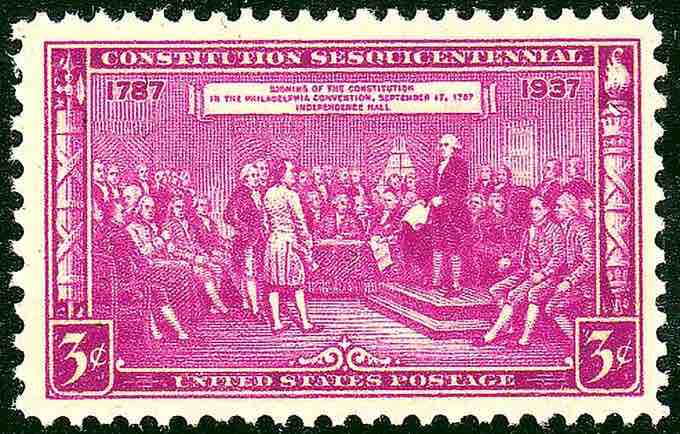Introduction
The Founding Fathers of the United States of America were political leaders who participated in the American Revolution. They signed the Declaration of Independence, took part in the Revolutionary War, and established the Constitution. The "Founding Fathers" included two major groups. The Signers of the Declaration of Independence signed the United States Declaration of Independence in 1776. The Framers of the Constitution were delegates to the Constitutional Convention and helped draft the Constitution of the United States .

Framers of the Constitution Stamp (1937)
US Postage Stamp depicting delegates at the signing of the US Constitution.
Some historians consider the "Founding Fathers" to be a larger group, which includes not only the Signers and the Framers but also ordinary citizens who took part in winning American independence and creating the United States of America. In 1973, historian Richard B. Morris identified seven figures as the main Founding Fathers: John Adams, Benjamin Franklin, Alexander Hamilton, John Jay, Thomas Jefferson, James Madison, and George Washington.
Delegates to the Constitutional Convention
In 1786–1787, twelve of the thirteen states—all but Rhode Island—chose seventy-four delegates to attend what is now known as the Constitutional Convention in Philadelphia (). Nineteen of these delegates chose not to accept election or attend the debates. The states had originally appointed seventy representatives to the Convention, but a number of the appointees did not accept or could not attend, leaving fifty-five delegates to draft the Constitution. Almost all of these delegates had taken part in the Revolution. At least twenty-nine of the delegates served in the Continental forces. Most of the delegates had been members of the Confederation Congress, and many had been members of the Continental Congress.
Occupations and Experience
The framers of the Constitution had extensive political experience. By 1787, four-fifths of the delegates had been in the Continental Congress. Nearly all of the fifty-five delegates had experience in colonial and state government. Furthermore, the delegates practiced a wide range of high- and middle-status occupations. Many delegates pursued more than one career simultaneously. They did not differ dramatically from the Loyalists, except the delegates were generally younger in their professions.
More than half of the delegates had trained as lawyers, although only about a quarter had practiced law as their principal career. Other professions included merchants, manufacturers, shippers, land speculators, bankers or financiers, three physicians, a minister, and several small farmers. Of the twenty-five who owned slaves, sixteen depended on slave labor to run the plantations or other businesses that formed the mainstay of their income. Most of the delegates were landowners with substantial holdings, and most were comfortably wealthy. George Washington and Governor Morris were among the wealthiest men in the entire country.
The Founding Fathers had strong educational backgrounds at some of the colonial colleges or abroad. Some, like Franklin and Washington, were largely self-taught or learned through apprenticeship. Others had obtained instruction from private tutors or at academies. About half of the men had attended or graduated from college. Some men held medical degrees or advanced training in theology. Most delegates were educated in the colonies, but several were lawyers who had been trained at the Inns of Court in London.
Notable Absences and Post-Convention Careers
Several notable Founders did not participate in the Constitutional Convention. Thomas Jefferson was abroad, serving as the minister to France. John Adams was in Britain, serving as minister to that country, but he wrote home to encourage the delegates. Patrick Henry refused to participate because he "smelt a rat in Philadelphia, tending toward the monarchy. " John Hancock and Samuel Adams were also absent. Many of the states' older and more experienced leaders may have simply been too busy to attend the Convention.
Most were successful in subsequent careers, although seven suffered serious financial reverses that left them in or near bankruptcy. Most of the group continued to render public service, particularly to the new government they had helped to create. The last remaining founders, also called the "Last of the Romans", lived well into the nineteenth century.